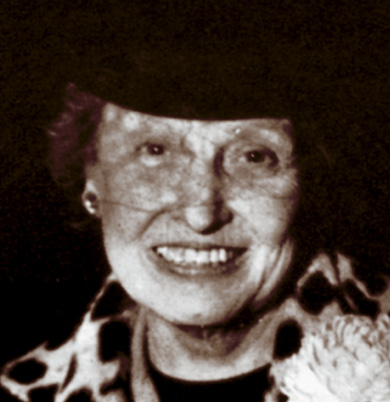
the letter now housed in Ablah Library's Special
Collections. This 1946 Parnassas photo of her was
taken during 1945 homecoming festivities.
Professor Emeritus George Platt, who is often referred to as Wichita State's unofficial historian, has uncovered an early university mystery. Maybe you can unravel the enigma of this mystery woman.
After Flora Colby Clough retired in 1931 after 35 years as professor of English literature and 25 as dean of women at the Municipal University of Wichita, Dean Neff and President Jardine, in 1935, named her University Historian at a yearly salary of $300 and assigned her to collect information about the municipal university's predecessor, Fairmount College.
Clough did not, as far as we know, complete a manuscript, but she did contact a number of individuals asking about their experiences and memories. Letters in the Ablah Library archives clearly show that the material she collected was brought back to Wichita by Grace Wilkie shortly before Clough's death in 1953. But where was it?
Last year while engaged in research for Presidential Partners: First Ladies of the University, published by the WSU Foundation in 2001, I opened a file in Ablah's Special Collections that contained letters written to Professor Clough during the late 1930s. A lightening bolt could not have caught my attention more dramatically. This had to be the Flora Clough history material. The lost had been found, but a new mystery was introduced. The papers included a fascinating two-page, typed reminiscence of the first years of Fairmount College (1887-1926), but with no indication of the author's identity. We have few firsthand accounts of those early years. Consequently, this manuscript gives us new insights about Fairmount founder Rev. Joseph Homer Parker and about President Nathan J. Morrison and his family. In the excerpt that follows, explanatory notes are inserted in brackets.
Rev. J.H. Parker was the pastor of Plymouth Congregational Church when I joined it at thirteen. He and his family of girls were in and out of our home frequently, as I was in theirs. When they built the beautiful home on Fairmount, now Holyoke Hall [northwest corner of Holyoke and 16th Street], it seemed one of the liveliest homes and locations then in Wichita. Rev. Parker hoped it would become the President's residence when the new College was established. When later he lost it for a comparatively small lumber bill, he felt bitterly disappointed. Fairmount too he had fondly hoped to make the Vassar of the west. He had a natural possessive sense of Fairmount. He had watched every detail of its building, even helped in its construction, and had guarded it from rain and windstorm as tenderly as he had watched over his children. So when that dream faded completely, he was heavy-hearted. …
The Morrisons, as I knew them, were a most interesting family. Their home on the hill [Putnam Cottage, northwest corner of Fairmount and 15th Street] was beautifully kept, shining in its cleanliness and order, its beautiful furniture so lovingly and tastefully arranged, reflecting the refinement of its occupants. … To Dr. Morrison I shall forever be indebted for the opportunity he gave me to complete my education by teaching and studying. … When I told him of my engagement, he asked me frankly why I couldn't have accepted his son. As frankly, I told him because he wasn't more like his father. … It was hard to believe, when I first saw Theodore Morrison, that he was the President's son. [Theodore was Fairmount's first football coach and second librarian. He died in 1912 leaving a wife and infant son whom we have not been able to trace.] An earnest S.S. [Sunday School] teacher of boys, my heart went out to the needs of this larger boy. I longed to help him and in some definite way show my gratitude for the kindness of his father. A tragedy in Theodore's life had made him careless, indifferent, embittered, with a warped mental and moral attitude toward life. I became his "father confessor." His earnest efforts in changing himself commanded my respect. It was a joy to see him take his place in his father's world. … His work in the Library was always painstakingly thorough and masterful. … He gave the best of himself to it, taking pride in its ready availability and usefulness to the student body."
We may never positively identify the young lady who declined Theodore Morrison's proposal. One who seems to fit the profile is Sadie (Ellis) Kramer, who came to Wichita with her family about 1886. Her father, Albert Ellis, was a landscape gardener and florist, and the family lived at the southeast corner of Fairmount and 13th Street. She attended Fairmount Academy and was a part-time student at the college, quite possibly teaching in the academy while pursuing a degree. She was also active in both Plymouth and Fairmount churches. Her marriage to Ernest Kramer '99 was the social event of Fairmount's 1901 commencement weekend. Although she did not complete her degree until later, she is listed with the class of 1900, the group with whom she did most of her college work. She died in 1949.
But is Sadie Kramer really our mystery woman?
— George M. Platt





